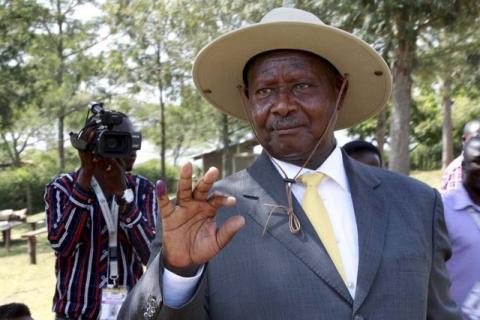Advertisement
Museveni in early lead in Uganda vote: electoral commission
KAMPALA (Reuters) - Uganda's incumbent president Yoweri Museveni took an early lead in the country's election, preliminary results from the Electoral Commission showed on Friday.
The commission said Museveni, one of Africa's longest-serving leaders, garnered 1.36 million votes out of a total 2.32 million votes counted so far from 6,448 polling stations - less than a quarter of the 28,010 stations across the country.
The tally gave Museveni 61.75 percent of the votes counted, followed by opposition leader Kizza Besigye with 33.47 percent.
Museveni, a Western ally, is seeking to extend his three decades in office. While he is widely expected to retain the presidency, young voters in urban areas have demanded change and blame him for not tackling corruption or creating jobs.
Kizza Besigye, who challenged Museveni unsuccessfully in three previous elections, has repeatedly insisted the election would not be free and fair and on Thursday accused the government of rigging the vote.
Late on Thursday afternoon, Besigye was briefly detained in Kampala for criminal trespass and assault.
A senior official with Besigye's party said he had been leading a crowd of supporters to a building where he claimed ballot stuffing was underway. Police called Besigye's accusations unfounded and outrageous.
Washington condemned his arrest, with State Department spokesman John Kirby saying it called into question Uganda’s commitment to a transparent election, free from intimidation.
Election day was otherwise largely peaceful, although voting was delayed in some areas, especially in the capital, and access to social media sites like Twitter and Facebook was blocked for much of the day, frustrating voters.
On Friday morning, voting resumed in a handful of areas, where delays in delivering polling materials had prevented some people from casting their ballot.
In the Ggaba neighborhood of Kampala - where voters and local media said protests by frustrated voters had been met with police teargas on Thursday - hundreds of people began gathering at a polling station in the early hours of Friday.
"It's our right to vote," said Geofrey Were, 32, as he stood waiting for the second day in a row. "This man has ruled us for 30 years. Obviously we need a change."
(Editing by George Obulutsa)



















Add new comment